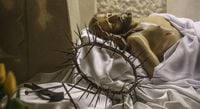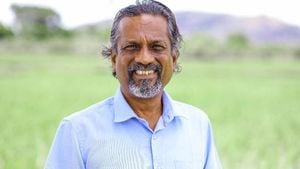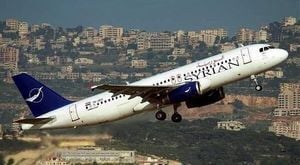As Holy Saturday approaches, many Catholics are left pondering a pivotal question: can they eat meat on this significant day? The answer, as it turns out, may surprise some. Holy Saturday, which falls just before Easter, is a day steeped in tradition and reflection, marking the culmination of Holy Week, the most sacred time in the Christian liturgical calendar.
The observance known as the Paschal Triduum begins on Holy Thursday and stretches through Good Friday, culminating on Easter Sunday. This year, Holy Saturday will be observed on April 19, 2025, a day characterized by silence and contemplation, as it commemorates the time Jesus spent in the tomb.
According to the guidelines established by the Catholic Church, mandatory fasting applies strictly to Ash Wednesday and Good Friday. On these days, Catholics are required to abstain from meat and limit their meals. However, Holy Saturday does not fall under this fasting regulation, allowing believers the freedom to eat meat if they choose.
While the Church does not mandate fasting on Holy Saturday, it encourages a spirit of moderation, particularly until the commencement of the Paschal Vigil, the evening service that marks the liturgical beginning of Easter Sunday. This time is meant for spiritual preparation, allowing the faithful to anticipate the joy of Christ's resurrection.
Holy Saturday is not only a day of reflection but also one of profound significance in the Catholic faith. As the Church teaches, it is a time when Jesus' disciples experienced deep sorrow and uncertainty following His death. This day also highlights the unique role of Mary, who remained steadfast in her faith during this tumultuous time.
One of the most cherished traditions associated with Holy Saturday is the blessing of food, known as "święconka." This ritual has become a hallmark of Easter celebrations in Poland. Families prepare baskets filled with symbolic foods, each representing different aspects of faith and renewal. For instance, eggs symbolize new life, bread represents the body of Christ, and horseradish signifies the suffering of Jesus.
In many parishes, the faithful visit the Holy Sepulchres, where they can pray and admire the unique decorations that adorn these sacred spaces. This year, the blessing of food will take place multiple times throughout the day, as believers bring their Easter baskets to church.
As noted by the Catechism of the Catholic Church, there are no strict obligations for Holy Saturday, but it emphasizes the importance of spiritual readiness. Although the blessing of food is a vital ritual, consuming these foods should ideally begin after the Paschal Vigil, aligning with the spirit of the liturgy.
In Poland, Holy Saturday is intimately tied to the rite of food blessing, and the Church encourages believers to engage in this practice as a form of spiritual preparation. While fasting is not obligatory, many choose to abstain from a full meal, symbolically accompanying Jesus in His tomb and fostering a sense of anticipation for the joy of Easter.
Interestingly, Holy Saturday is often mistakenly referred to as the Paschal Vigil. In reality, the Paschal Vigil begins after sunset on Holy Saturday, marking the transition from death to new life through the resurrection. This liturgical celebration consists of four parts: the Liturgy of Light, the Liturgy of the Word, the Baptismal Liturgy, and the Eucharistic Liturgy.
As the faithful gather for the Paschal Vigil, they will witness the blessing of water and fire, and many children will receive the sacrament of baptism. This moment marks a significant milestone in the liturgical year, as it transitions from the solemnity of Holy Saturday to the jubilant celebration of Easter Sunday.
In summary, while Holy Saturday does not require fasting, it is a day rich in tradition and spiritual significance. The Church encourages believers to reflect on the meaning of this day, to engage in the blessing of food, and to prepare their hearts for the joy of the resurrection. As the sun sets on Holy Saturday, the promise of Easter dawns anew, inviting all to celebrate the triumph of life over death.
As Holy Saturday approaches, many may wonder whether they are required to attend church services on this day. According to Canon Law, Holy Saturday is not classified as a mandatory holy day, meaning that Catholics are not obliged to attend Mass. This is in contrast to several designated holy days within the Church, such as all Sundays, January 1 (New Year’s Day), and December 25 (Christmas).
In conclusion, Holy Saturday serves as a poignant reminder of the trials faced by Jesus' disciples and the unwavering faith of Mary. It is a day for contemplation, preparation, and the celebration of life through the resurrection. As the faithful gather for the Paschal Vigil, they embrace the hope and joy that Easter brings, marking the end of a solemn period and the beginning of a new chapter in the Christian journey.







